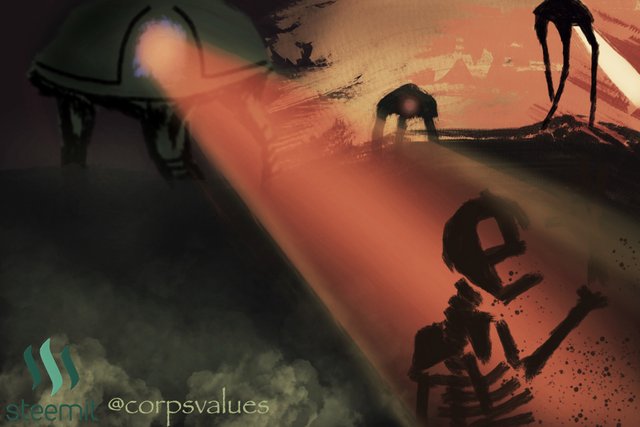War of the Worlds and Crypto. 1938 and 2018
“The nose of a mob is its imagination. By this, at any time, it can be quietly led.” - Edgar Allan Poe
I guess that's it. Yes, I guess that's the . . . thing, directly in front of me, half buried in a vast pit. Must have struck with terrific force. The ground is covered with splinters of a tree it must have struck on its way down. What I can see of the . . . object itself doesn't look very much like a meteor, at least not the meteors I've seen. It looks more like a huge cylinder. It has a diameter of . . . what would you say, Professor Pierson?
https://www.sacred-texts.com/ufo/mars/wow.htm
SAN FRANCISCO — Bitcoin has been in a bull market like few the world has ever seen.
At the beginning of the year, the price of a Bitcoin was below $1,000. It hit $5,000 in October, then doubled by late November. And on Thursday, less than two weeks later, the price of a single Bitcoin rose above $20,000 on some exchanges, according to Coinmarketcap.
https://www.nytimes.com/2017/12/07/technology/bitcoin-price-rise.html
On October 30, 1938, Orson Welles interrupted regular broadcasting on CBS radio stations with a radio adaption of the sci-fi novel “War of the Worlds,” by H.G. Wells.
Millions of Americans were tuned in.
The producers had prefaced the adaption, which was scripted to read like a live, breaking news broadcast, to warn the listeners that this was a fictional narrative.
However, at that time, a more popular show, the ventriloqist Edgar Bergen, aired on the NBC station, and later surveys revealed that the majority of listeners would only switch to CBS once the NBC feature had finished.
For that reason, the warning was missed by many, who switched channels to find themselves listening to what sounded like convincing live news, complete with voice actors and sound effects.

Ladies and gentlemen, this is the most terrifying thing I have ever witnessed . . . Wait a minute! Someone's crawling out of the hollow top. Someone or . . . something. I can see peering out of that black hole two luminous disks . . are they eyes? It might be a face. It might be . . .
https://www.sacred-texts.com/ufo/mars/wow.htm
At the WebSummit conference in Lisbon, Portugal, Draper was speaking with Forbes. Expressing his views on where he sees the digital currency market, he said:
In five years, if you try to use fiat currency they will laugh at you. Bitcoin and other cryptocurriences will be so relevant … there will be no reason to have the fiat currencies.
Draper, founder of Draper Fisher Jurvetson (DFJ), an American venture capital investment firm, has led investments in Twitter, Skype and Tesla. Now, he’s turning his attention to cryptocurrencies.
https://www.ccn.com/bitcoin-millionaire-tim-draper-cryptocurrencies-will-replace-fiat-5-years/
In the 1930s, radio broadcasting was well on its way to replacing newspapers as the average American’s source of news.
This was the first time that something that could be construed as “willfull deceit of the American public” via a fictional radio broadcast had occurred.
Although, as we know, the show had been prefaced with a warning of its fictional nature, this didn’t stop a loud outcry from media outlets across the country, and several lawsuits being (unsuccessfully) filed.
Even before the broadcast had run its short course, the CBS station that it was airing from had filled with uniformed police officers, determined to clear up the public misunderstanding after a flood of panicked 911 calls.
Although the “nationwide panic” was not as significant as some tried to recount it, there were traffic jams of people attempting to flee New Jersey upon recounts that New York was destroyed, and calls to police departments begging for gas masks to survive the “alien poison gas canisters.”
Fast forward to the present day.
To the average household with disposable income, “investment” means stocks, bonds, IRAs, and 401Ks
Suddenly, major news outlets are reporting on a new phenomenon called “cryptocurrency.”
Stories are circulating of 1000% returns on money invested over a span of mere months.
Enter waves of people (I know quite a few) falling over themselves to buy bitcoin at its peak, right before it lost 65% of its value.
We are talking about FUD of course (fear, uncertainty, doubt) as well as FOMO (fear of missing out) but what we are really talking about is “herd mentality.”

From an evolutionary perspective, herd mentality is actually a good thing, since it relies on a “collective wisdom” to rule out the fails that one would encounter trying to survive on one’s own (which foods are poisonous; which animals are dangerous).
However, the internet has skewed that, and marketing firms are now hardened experts at knowing just how to manipulate that part of our brain.
Furthermore, the internet is good at presenting as a “majority” what may be a very small handful of people, or even just one skillful individual.
Being on the internet requires one to be more cagey and untrusting than ever, and ultimately to have to put millenia of psychological evolution aside.
So I have put up for side-by-side comparison two historical incidents: the “War of the Worlds scare” from Halloween of 1938, and the “Bitcoin fomo” of 2017-2018.
Both were incidents driven by emotional reactions galvanized by media reports.
But are they really equitable examples?
In 1938, some people heard the highly unlikely news that Martians were invading, believed it, and ran for the hills.
In 2018, some people heard the easily verifiable news of cryptocurrency’s meteoric rise, and decided to invest their life savings after looking at graphs that showed a line reaching upward at a steep ascent.
Which ones were the fools?
Also, in 1938, there were several attempted but unsuccessful suicides, some who stayed at home trusting law enforcement to handle the Martian invaders, and obviously some who hedged their bets on the side of the radio broadcast being a fiction.
Also, in 2018 there are plenty who have fallen into despair after watching their portfolios dwindle, some who have left their money with their financial institutions, trusting the “professionals” to do their investing for them, and some who are sitting back laughing, thinking that cryptocurrency is a fad that will blow over.
In 1938, the only thing listeners of that broadcast had to go on was a hunch.
In 2018, we have the limitless resources of the world wide web with which to educate ourselves and guide our decisions.
It is far from an easy task, and most of us will end up looking for a “trusted authority” to advise our decisions.
Others will get overwhelmed by conflicting information, and become frozen in indecision.
Is it hopeless?
This all boils down to a “public debate” and lucky for us, there are rules, thousands of years old, to guide us on how to look out for “false arguments.”
These false arguments are called fallacies of logic, and I did a recent post which identified the most common ones used, with examples taken from the #me-too debates.
https://steemit.com/steemit/@corpsvalues/logical-fallacies-to-avoid-when-discussing-me-too
And yes, you’re welcome, I am going to do the same thing again, but this time with examples taken from the crypto-sphere.
What should we do when we encounter a fallacy?
Discard it from your mind, as useless information, and move on

"Straw-man" fallacy
Mis-representing a situation or someone else’s argument, in order to make it easier to present your own argument as valid
“Cryptocurrency is the favorite currency of criminals. By governments allowing blockchains and currency exchanges to operate they are encouraging crime and essentially funding the terrorists and drug lords of the world” (FALSE - here is an article from 2 years ago discussing this https://www.coindesk.com/bitcoin-cops-criminals/)
"Slippery slope" fallacy
If we allow option A to happen then it will result in scenario C. Therefore we should/should not allow option A. (this is when there is actually no existing connection between A and C)
“If I go all-in on cryptocurrency and HODL I will be rich eventually” (This hinges on the unverifiable presumption that whatever cryptocurrencies you are investing in actually have a long-term future in store)
"Ad hominem" fallacy
Attacking the individual making the argument instead of their argument
“John McAfee is crazy right? Didn’t he spend time in jail? Doesn’t he have some sort of ongoing murder investigation against him? Since his entire public image these days is wrapped up around cryptocurrency and crypto security doesn’t this show crypto as a shady entity favorited by shady individuals? And what about Ross Ulbricht?”
"Appeal to authority" fallacy
Using the opinion or position of an authority or institution in place of an actual argument
The CEO of JPMorgan Chase went on the record as saying, “(Bitcoin is) worse than tulip bulbs. It won't end well. Someone is going to get killed.” (Appeal to authority can actually go both ways, and it is a favorite mechanism for media outlets to give their opinions an instant air of trustworthiness. These days, there is no shortage of high-ranking members of society willing to step forward with an opinion)
"False Cause" fallacy
Postulating that there is a real connection between two situations and that one is therefore the cause of the other.
“When the value of Bitcoin rises enough, it will replace the dollar as the world reserve currency, because its decentralized stability will be favored” (The dollar is the world currency because it goes hand in hand with the United State’s pre-eminent role in international trade, first world alliances, and the US military)
"Black or White" fallacy
Presenting two scenarios as the only two possible outcomes when in reality there are many more
“Either BTC will come out on top or BCH will. Alternatively either BTC or ETH.” (There is no “obvious” future for cryptocurrency at this point. Betting on the heaviest contenders does not make for smarter/safer investing)
"Anecdotal" fallacy
Citing personal experience or an isolated incident as a replacement for solid rhetoric, especially to disprove a more solid argument
“My buddy bought into this ICO and tripled his money in a week- ICO’s are the best way to make money fast” (they are also the best way to lose money fast)
"Red Herring" fallacy
Diverting attention toward an unrelated issue to remove attention from the actual issue at hand and promote the introduction of false conclusions
“Look over there! A study that shows 90% of monkeys throw poop at Bitcoin when introduced to crypto!” (and the crypto market sheds another billion of value)
"Personal incredulity" fallacy
stating that because one finds something difficult to believe that it is most likely not true
“So all we do is follow these steps and then end up with free byteballs worth like 50 bucks? Sounds too good to be true” (that was me sad face)
"The fallacy" fallacy
stating that because a point has been poorly made, that it is most likely entirely wrong. Or vice versa, that just because it is phrased well, doesn’t mean it’s true. You have to separate the manner of speech from the argument made
I saved this fallacy for last in the hope that those who have found fault with this article might show me some mercy. please please please please
We must speak our minds openly, debate our disagreements honestly, but always pursue solidarity - Donald Trump
(wait, really? He actually said that? Such pretty words! YES in his inauguration speech!)
Welp, there goes my mercy.
Thanks for reading!
(artwork is all mine, hope that it made for a more enjoyable read)
Do you have pencil, paper, and a thought in your head? Then you can cartoon!
Be sure to enter my weekly cartooning contest #cartoon-off. Otherwise, try to stop by and support the talented contributing cartoonists! We have a great blend of first time cartoonists and veterans!
9 #Steembasicincome shares in prizes, 3 categories.
https://steemit.com/cartoon-off/@corpsvalues/fifth-weekly-cartoon-off-contest-guest-judge-sanderjansenart
.jpg)
The weekly cartoon contest is sponsored by @corpsvalues, in the spirit of giving back to the Steemit community and fostering growth.
@corpsvalues is a US military veteran who does artwork to promote discussion and healing to those involved in wars, and is an avid cartoonist and writer. He does all of his own artwork in his posts, which range in topic from comic to tragic. He firmly believes that artwork is for everyone, backed by studies that have shown how artwork builds and mends neural pathways in our brains. For him, this competition is a mission to bring as many people as possible into visual creativity and foster the continued work of those already doing it.
.jpg)
Heh, this kind of segues out of our conversation a few weeks ago about fiction mirroring the fears of the populace. The alien invasion scenario would have been pretty potent at a time when fears about invasion by a foreign power ran high. Interesting that the radio reboot happened just a few years before WW2 and the last film reboot came out shortly after the invasion of Iraq. Hmmm... 😉
I think the crypto craze was fueled by a lot of residual anxiety from the 2008 financial crisis, with both the decentralized nature of the coins and their potential for outsize returns in a low interest rate environment contributing to the feeding frenzy.
My favorite part about this debate is that we’ll see a first verdict within the next decade. It’s rare to get closure on any kind of any kind of debate, so I’m looking forward to finding out who is right and who is proved wrong. I’m just along for the ride on this one - no real predictions of my own to offer here.
Hey, thanks for the read and great comment ;)
Great point, on the timing for the reboots of HG Wells' story, completely missed that parallel.
Also good point, on the crypto craze following less than a decade after the 2008 crisis, where so many lost so much and were feeling the need to be extra vigilant about taking personal oversight of their finances.
I honestly don't think that anyone can predict the future on this now, although the trends of FOMO3D and Augur and and ICO bull runs showing that the vast majority in crypto are feeding gambling tendencies, makes me wonder how this will affect its long term development.